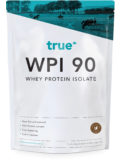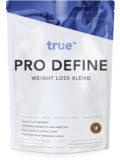Do you ever feel nauseous during your workout, yet can’t stomach a small mid-workout carb intake? For those partaking in longer-endurance styled workouts, keeping your body effectively fueled can be a real struggle. To help you understand the best ways to maintain peak performance during endurance events, here’s a quick guide to fueling for endurance.
What types of macronutrients are good for endurance?
Generally, the fundamental macronutrients to endurance are carbohydrates. Carbohydrates are a key fuel source for exercise, especially during prolonged continuous or high-intensity exercise. The body stores carbohydrates as glycogen in the muscles and liver, however its storage capacity is limited.
.jpg)
When an athletes glycogen storage is depleted, the results include fatigue, impaired performance and a reduction in immune system function. Subsequently, in order to prepare your body for an endurance event, individuals should plan their carbohydrate intake around the event, or partake in ‘carb loading’. Similarly, for events based on longevity, it is advised that athletes have some form of carbohydrate intake during the workout. Additionally, a slight protein intake prior to a workout can help provide your muscles with fuel and prevent unwanted muscle breakdown (catabolism).
For more information on the importance of pre-workout protein, click here. Prior to a workout, generally avoids fats as they can slow down the carbohydrate and protein absorption process.
How many carbohydrates do I need?
An individual’s carbohydrate requirements are dependent on a wide range of factors, including size, body composition goals, environmental conditions, training frequency, training duration, and training intensity. Since an individual’s training activities generally change on a daily basis, their carbohydrate intake should fluctuate to reflect this.
On high intensity training days, more carbs should be consumed, and on light/non training days carb intake should be reduced. Nevertheless, the Academy of Nutrition and Dietetics recommends active individuals consume approximately 0.7 grams of carbohydrates per kilogram of body weight per hour of endurance exercise.
During exercise, athletes should consume high GI carbohydrates as they are absorbed into your system faster, meaning they are more readily available to your body to burn. Similarly, high GI carbohydrates won’t weigh you down like low GI carbohydrates can.
Who should consume carbohydrates mid-workout?
The importance of a mid-workout carbohydrate intake depends on the type of training you are doing. If you’re training lightly or heavily for less than an hour, and have had a sufficient pre-workout meal, you can probably skip the mid-workout carb boost. Similarly, provided your pre-workout nutrition was adequate, you probably won’t require any mid-workout carbohydrates for long, low intensity workouts.
However, if you are training moderate-heavily for more than an hour, mid-workout carbohydrates are very beneficial. Athletes that are most likely to fall into this category include cyclists, distance runners and individuals involved in high intensity team sports such as football.
The replenishment of carbohydrates during prolonged exercise can benefit sports performance both physically and mentally. Not only will it delay the decline in exercise intensity, it will also delay the decline in an individual’s concentration and mental skills. Subsequently, it can be said for athletes in this category, mid-workout carbohydrate boosts are a must.
What carbohydrates should be consumed?
The short answer, as previously suggested, is carbohydrates that are high on the glycemic index (high GI). These carbohydrates are mostly ‘simple carbs’ and have higher levels of sugars than foods that are low GI. However, don’t be fooled. When consumed properly, these sugars won’t have an adverse effect on any weight loss or physique goals; rather they will simply help you perform at your best for longer.
Generally speaking, carbohydrate infused fluids and gels are better than bar-form carbohydrates as they are more easily digested. In terms of a specific product, I would recommend True Endurance Fuel. The unique blend is designed specifically for endurance athletes who train for long periods of time such as cyclists, long distance runners and ironmen. The formula comprises fast releasing high GI carbs and a specialized electrolyte blend to optimize rehydration during activity. Basically, True Endurance Fuel will provide you with all your mid-workout carbohydrate, electrolyte, and mineral needs.
Summary
- Carbohydrates and Protein are important pre-workout meals, especially endurance. Avoid fats in this period as they can slow down the absorption process.
- The Academy of Nutrition and Dietetics recommends active individuals consume approximately 0.7 grams of carbohydrates per kilogram of body weight per hour of endurance exercise.
- If training moderately-heavily for periods longer than an hour in duration, a mid-workout carbohydrate boost will be especially beneficial.
- Intra-workout carbohydrates can help maintain both mental and physical performance for longer.
- Have high GI carbohydrates during your workout. Avoid having low GI carbohydrates during workouts as they take too long to digest.
- Try True Endurance Fuel for a good quality mid-workout carbohydrate boost.
- Before making any dramatic changes in your diet and nutrition consult your local physician.











 Meal Preps
Meal Preps
 Nutrition Tips
Nutrition Tips
 Exercise
Exercise
 News & Updates
News & Updates
 Lifestyle
Lifestyle






Leave a comment